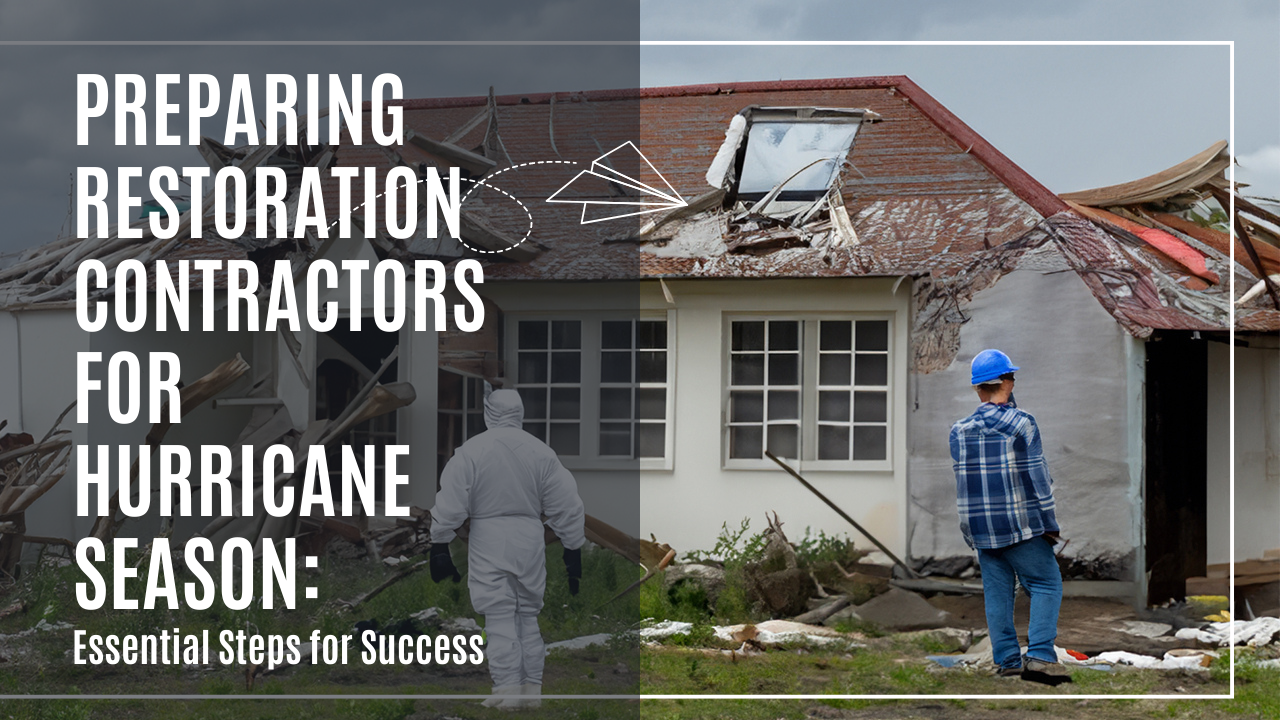Preparing Restoration Contractors for Hurricane Season: Essential Steps for Success
As hurricane season approaches in the United States, restoration contractors face a unique set of challenges and opportunities. With the potential for widespread property damage and increased demand for their services, contractors must be well-prepared in order to thrive in the aftermath of these powerful storms. From understanding licensing laws and lien requirements to implementing safety plans and updating contracts, a little preparation goes a long way in navigating the complexities of hurricane-related restoration work.
- Update Contracts for Each State of Operation
Having well-drafted, up-to-date contracts is crucial for any restoration contractor, particularly during hurricane season. Contracts provide a legal framework that outlines the rights and responsibilities of all parties involved and helps prevent disputes and misunderstandings. However, it’s important to note that contract laws can vary from state to state.
To protect your interests and ensure enforceability, review and update your contracts to align with the laws of each state where you operate. Consider including provisions that address payment terms, change orders, scope of work, warranty provisions, dispute resolution mechanisms, and other essential elements. We offer comprehensive contracts packages for Texas, Florida, California, and Michigan, as well as general packages that can be customized for compliance in other states. Additionally, we offer a contracts package specific to Contents Restoration contractors.
- Familiarize Yourself with Licensing Laws and Requirements
One of the first steps in preparing for hurricane season is to ensure compliance with licensing laws and requirements in the states where you plan to operate. Licensing laws for restoration contractors can vary from state to state, and it is crucial to understand and meet the specific qualifications and regulations set by each state’s licensing board. Failing to obtain the necessary licenses can result in legal consequences and may hinder your ability to bid on projects or receive payments for your work.
Research the licensing requirements in each state you intend to work in, including any additional certifications or registrations that may be necessary. Ensure that your business and employees meet the required qualifications and that all licenses are up to date. By proactively addressing licensing matters, you demonstrate professionalism and build trust with clients and regulatory bodies.
- Develop a Plan for Collecting on Projects
Restoration contractors should implement a collections plan from Day 1 of every job. This plan should include clear payment terms and expectations outlined in the contract, timely and accurate invoicing, and a diligent follow-up process for overdue payments. Contractors should maintain open lines of communication with clients and promptly address any payment concerns or discrepancies. In cases where disputes arise, it is essential to have a strategy for resolving them while minimizing the impact on cash flow. By having a well-defined plan for collecting what is owed, restoration contractors can maintain financial stability and continue to deliver exceptional services during hurricane season and beyond.Our Book on Collections and Collections Toolkit are designed to help restoration contractors streamline their collections with strategic tools and systems designed to maximize results.
- Stay Updated on Lien Laws and Procedures
Hurricane-related restoration projects often involve insurance claims and potential disputes over payment. To protect your rights and ensure fair compensation, it is crucial to understand lien laws and practices. Lien laws provide contractors with a legal mechanism to secure payment for their services by placing a lien on the property.
Research and familiarize yourself with the lien laws specific to the states where you operate. Understand when pre-lien notices are required. Understand the deadlines and requirements for filing and serving liens, as well as the process for enforcing them if necessary. Additionally, establish efficient internal procedures to track and manage lien-related documentation. By being knowledgeable and proactive, you can safeguard your financial interests and minimize the risk of payment issues.
- Develop a Comprehensive Safety Plan
Hurricane restoration work can be hazardous, with potential risks such as structural instability, electrical hazards, and exposure to hazardous materials. To prioritize the safety of your workers and mitigate potential accidents, it is essential to develop a comprehensive safety plan.
Start by conducting a thorough risk assessment of the work environments, identifying potential hazards and implementing appropriate control measures. Ensure that all workers receive proper safety training and have access to personal protective equipment (PPE) suitable for the tasks they perform. Regularly review and update your safety plan to incorporate industry best practices and comply with relevant safety regulations.
- Establish Relationships with Local Suppliers and Subcontractors
During hurricane season, the demand for restoration services surges, leading to increased competition for resources. Establishing strong relationships with local suppliers and subcontractors can be a game-changer for your business. Maintain open lines of communication, build rapport, and negotiate mutually beneficial agreements that prioritize prompt response times and reliable services.
By cultivating these partnerships in advance, you can ensure access to necessary materials, equipment, and additional labor when the demand is at its peak. Collaborating with trusted suppliers and subcontractors can enhance your efficiency, reputation, and ultimately, your ability to deliver exceptional results to your clients.
- Stay Informed on Evolving Industry Standards and Best Practices
The restoration industry is constantly evolving, with new technologies, techniques, and industry standards emerging. To stay competitive and provide the best possible service to your clients, it is vital to stay informed and adapt to these changes.
Join professional associations and organizations that focus on restoration and disaster recovery, such as the Restoration Industry Association. Attend industry conferences, workshops, and webinars to stay updated on the latest trends and best practices. Engage in continuing education and encourage your team members to do the same. By embracing innovation and staying ahead of the curve, you can position your business as a leader in the restoration industry.
Hurricane season presents both challenges and opportunities for restoration contractors. By taking proactive steps to prepare, you can position your business for success. From understanding licensing and lien laws to prioritizing safety, updating contracts, fostering relationships with suppliers, and staying informed on industry developments, each of these steps is essential for a successful hurricane season.
Remember, thorough research, compliance with regulations, and a commitment to excellence are the pillars of a thriving restoration business. By implementing the strategies discussed in this guide, you will be well-equipped to navigate the intricacies of hurricane-related restoration work and provide exceptional service to clients in need. Embrace the challenges, adapt to the evolving industry landscape, and continue to learn and improve—success awaits you in the upcoming hurricane season.






